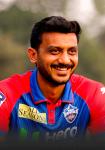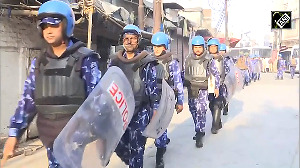IPL made the news, but most sports bodies are run like cliques
Given that BCCI is the world's richest cricket board and its 3-year old baby IPL is already a $4.13 billion brand, it's not surprising the current scandals are receiving the kind of attention they are. What's true of BCCI, and IPL, minus the stunning financial success, is true of most sports bodies in the country -- they're mostly run by cliques, have little or no transparency, and going by India's medal tally in almost any sport you can think of, they've done little for the game.
And while the government is applying pressure to change BCCI now, the attempt to reform India's sports federations is a battle that's been fought right since 1975, and with little success. It is a battle that Sports Minister MS Gill is personally interested in.
There's a BCCI connection to the other sports bodies as well. N Srinivasan, who raised eyebrows by holding the posts of secretary of BCCI along with being the owner of the IPL franchise Chennai Super Kings is, interestingly, also the president of the All India Chess Federation, a position he has held for the last 9 years. This, as Gill has pointed out, is violation of the rules.
Indeed, in 1975, the Ministry of Education and Social Welfare wrote to the presidents and secretaries of the Indian Olympic Association (IOA) and the National Sports Federations (NSF) stating that "no office bearer of a National Federation/Association shall be eligible to be the office bearer, simultaneously, of any other National Sports Federation /Association, excepting the Indian Olympic Association."
In a recent TV interview, Gill said the law would be enforced: "It has to be done and it will be done". He also told the Rajya Sabha that there was a need to regulate sports federation chiefs who had turned the bodies into their fiefs.
A majority of these men and women do not have the professional background in their designated sport that can guide their decision-making process.
Viren Rasquinha, a former Indian hockey captain and Olympian, laments the lack of professionalism, transparency and accountability he encountered while playing for the country, and says, "It is high time that honorary posts became a thing of the past. Every post should be held by a paid professional who inherently understands hockey. Salaries should be set at the market value and the best people should be hired to run our NSFs."
The same 1975 letter says, "no such office bearer shall hold office consecutively for more than two terms or 8 years." Contrast this with the situation in the Archery Association of India where the BJP's Vijay Kumar Malhotra has been in power for 31 years, Suresh Kalmadi has headed the IOA for the last 15 years and J S Gehlot has headed the International Kabadi Federation for the last 24 years. The list goes on (see table).
A good way to see what these bodies have achieved is to take a quick look at India's sporting accomplishments -- a nation of over a billion people managed to scrounge together exactly 3 medals at the 2008 Beijing Olympics. China won 100 medals at the same event, topping the medal table.
Unlike his predecessors, Gill is proactive. As a former Chief Election Commissioner, he has attached importance to the value of free and fair elections.
"There has to be clean and clear voters' lists and independent Returning Officers and a secret ballot", he said,referring to how officials are elected to positions of power. Gill has also been quite adamant about bringing in various NSFs and the IOA under the purview of the Right to Information (RTI). When a court case came up before the Delhi High Court and the IOA didn't want to answer questions, Gill insisted IOA give a reply. Under Section 5 of the RTI Act, NSFs will now have to designate central public information officers and appellate authorities to continue to receive grants from the Government.
The case of the hockey federation is an interesting one. The Indian Hockey Federation (IHF) that was headed by K P S Gill was disaffiliated from the IOA in 2008, ostensibly because IHF had violated the Federation International de Hockey's directive to unify its male and female hockey bodies -- insiders says IHF was in the process of doing this. In its place, Hockey India was set up as an ad hoc body by the IOA.
The IOA has the power to recognise NSFs, which allows them to compete in sporting events and, in turn, the NSFs have voting rights in the IOA and elect its President. In other words, it's a bit of a cosy club -- and if the NSF doesn't play ball, the IOA can disaffiliate it and replace it temporarily with an "ad-hoc committee" made up of its own officials.
So while the IOA derecognised the IHF on the grounds of poor performance, the Indian Weightlifting Federation which has been plagued by doping charges is still a part of the IOA family.
In an affidavit in a court case, on February 3, the Ministry of Youth and Sports Affairs said the government had recognised Hockey India on the following conditions -- "early finalisation of an election schedule, putting in place comprehensive election guidelines, appointment of an election observer by the Government, ensuring a free, fair and transparent election process and setting up a dispute resolution and grievance hearing mechanism in connection with the grant of affiliation to state unions."
Yet, "notwithstanding the above, Hockey India appointed G S Mandar, president Weightlifting Federation of India, who is also vice-president of the Indian Olympic Association as the returning officer."
Gill's ministry has to file yet another affidavit, in a fortnight, on what it plans to do to ensure no NSF has a head for more than two terms, and that no two NSFs have the same head.
Watch this space.








 © 2025
© 2025